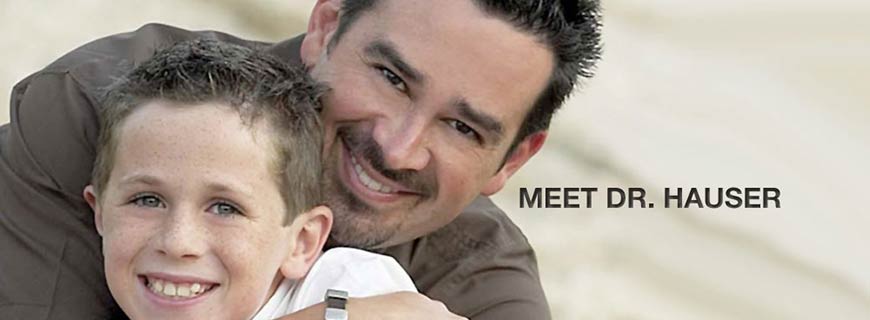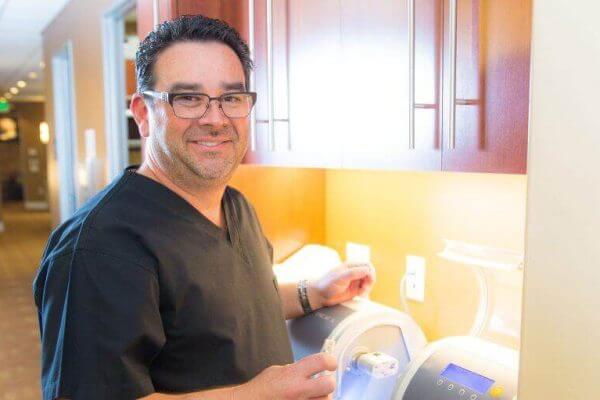Teach Your Kids How to Take Care of Their Teeth and Gums
Loss of Tooth Enamel and Damage
Eroding Teeth and Discoloration Could Be a Sign Something is Wrong
If a child has a severely discolored tooth, such as black, grey or yellow, it’s a sign that the tooth grew in without any enamel. Sometimes, it can be a genetic defect that one or both parents had in their childhood years.
The discoloration is actually the color of the tooth underneath the enamel. The enamel is the whiter part of the tooth and the discoloration is the soft layer underneath the enamel, which is known as the “dentin.”
As long as there is no decay, the tooth should be fine. However, seeing Dr. Derek B. Hauser, DDS, who has treated thousands of children over the last 20 years, will know if there is a condition present and treatment for the lack of enamel. Don’t take a chance and assume everything is all right with a child’s oral health, because there could be underlying conditions that need to be addressed.
Diet Does Play a Role in a Child’s Oral Health
As far as diet, unless a child is eating blue lollipops or artificially colored products all the time, it’s most likely a lack of enamel and genetics. Having healthful foods like apples, carrots and drinks without sugar is important for children and adults.
Teaching a child how to properly clean their teeth at a very young age and get them excited to brush each morning and night is setting them up for great oral health over the years. This means parents save on dental costs for cavities and fillings, too. Perhaps giving them a gold star each time they brush on the kitchen calendar will make them feel great for accomplishing such an important daily task while they get great praise from parents for reaching each daily and weekly goal.
Why is My Child’s Teeth Dirty?
A lot of children’s teeth are just very dirty because parents trust the child when they say they brushed. Making sure a child knows how to brush and floss is one part—but monitoring their oral health and cleanliness is equally important. A child who doesn’t like to brush and floss will often say they brushed and flossed when they truly did not. That will cost a parent more money at the dentist, so hands-on oral/visual checks is important each day if their teeth seem dingy and yellow.
If a child is on antibiotics between the ages of zero and three, a parent should ask questions to their pediatrician to make sure those antibiotics will not discolor their teeth, which could be for the rest of their life. If that happens, then only cosmetic dentistry will help alleviate stained teeth. Oftentimes, professional whitening cannot help teeth damaged by antibiotics. CEREC veneers are the best solution. So questioning now what could impact a child’s smile for years to come is important.
Flossing Chips Teeth
When a child or adult flosses, sometimes part of a tooth can chip off. If that happens, seeing your dentist is important, because a digital x-ray will see if it’s a baby tooth or adult tooth. If it’s an adult tooth, it could have so much decay that it broke off. If this is the case, then it must be cleaned and repaired to avoid further damage to the tooth and nerve.
Proper Brushing, Flossing and Mouthwash—Still Have Bad Breath
If a child is brushing, flossing and using mouthwash and shortly thereafter still has bad breath, then there could be an underlying medical condition, such as stomach, tonsils or sinus issues. Diabetes could be a concern as well. Seeing your primary care physician is something a parent will want to do and rule out any conditions since the oral hygiene is being implemented with great care and there is no decay.
If the primary care physician rules everything out, then seeing Dr. Hauser to make sure proper oral care is being done and helping the child might be all that is needed. Yet, taking the child to a regular doctor for proper treatment and diagnostics is recommended if bad breath is present with good oral care.
Traumatic Injury to the Mouth
If a child has been hit in the mouth by anything and the teeth appear to be fine and they aren’t loose or wiggling and no visible bleeding or swelling is present, a parent should still bring them in to see Dr. Hauser because seventy percent of a person’s teeth are below the gum line.
A digital x-ray is required to make sure there is no damage to the teeth, which cannot be seen with the eye alone. If any child is playing a sport, it’s imperative they wear a helmet, grill and mouth guard to protect their teeth, gums and jaw, too.
Dr. Hauser has a private practice and believes in taking care of families and practices safe and comfortable dentistry for kids. Dental care for kids is something a parent can do to increase a child’s oral health and physical health for years to come. Call (951) 244-9495 or Request an Appointment Online Today. Dr. Hauser’s own son is his patient, too!





